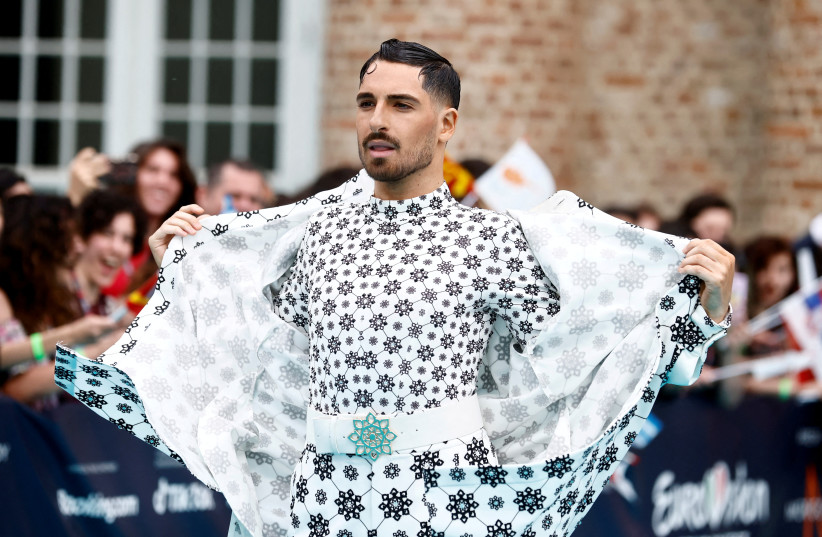Eurovision 2022 was a small stumble for Israel, which did not make the finals for the first time since 2014, it was a big success for Ukraine as the country, facing a brutal Russian invasion at home, triumphed at the Eurovision finals in Turin.
Ukrainian President Volodymyr Zelensky praised the win on social media, saying, “Our courage impresses the world, our music conquers Europe! Next year, Ukraine will host the Eurovision song contest.” The winning country becomes the host of the event the following year.
While the 40 national juries were favorable to Ukraine’s song, “Stefania,” an anthem sung to a loving mother in Ukrainian by the Kalush Orchestra, and placed it fourth in the rankings, the votes from fans watching at home pushed the song into first place. Fans gave “Stefania” a whopping 439 points. By contrast, the second place song in the fan rankings, from Moldova, received 239 points from the audience.
While some viewers ripped the choice on Twitter as being overly political, saying the winners should be chosen on the quality of the music alone and “Stefania” was not one of the year’s best songs, the vote spoke for itself: Eurovision fans support Ukraine in its fight. Oleh Psiuk, the group’s frontman, hails from the besieged city of Mariupol and as the group won, he called out, “Please help Ukraine, Mariupol. Help Azovstal right now.” Azovstal is the steel plant in Mariupol where a small force of Ukrainian soldiers has held off Russian troops for months. The European Broadcasting Union, which generally frowns on political statements by contestants, chose to make an exception to its policy in this case. “We understand the deep feelings around Ukraine at this moment and believe the comments of the Kalush Orchestra and other artists expressing support for the Ukrainian people to be humanitarian rather than political in nature,” the EBU wrote in a statement.
It was certainly an unusual year, as the Ukrainian Eurovision commentator, Timur Miroshnychenko, was forced to broadcast his coverage of the event from a bomb shelter, posting a picture of himself in the shelter on Instagram.

William Lee Adams wrote on the website, Wiwibloggs, that the Kalush Orchestra “didn’t just tug on heartstrings. It ripped them out and set them on fire. Lead singer Oleh Psiuk rapped about his mother Stefania — the song’s titular character — and celebrated her strong yet supple hands, which encouraged him through good times and bad. Written prior to Russia’s invasion of Ukraine, the song took on new meaning in light of the war. It now reads as Mother Ukraine protecting her children at the same time they strive to defend her.”
Even if Israel’s representative, Michael Ben David, with his self-empowerment anthem, “I.M,” had made the finals, he would not have stood a chance against the Kalush Orchestra. Although Ben David has an appealing backstory about having been bullied for being gay and supporting himself by working in a grocery during the pandemic, but commentators felt the song was not distinctive enough to make the cut.
However, Ben David received a great deal of attention at the semifinals where he performed on Thursday night after he jumped up alongside the contest’s hosts in the Green Room. He waved an Israeli flag, tried to kiss the host, Laura Pasini, who turned away and then kissed host Alessandro Cattelan on the cheek. The next day, a mistranslation of a reporter’s question at a press conference led to reports in the media that Israel had been disqualified. The EBU released a statement saying that this was not the case and that Israel had failed to qualify for the finals but that this was not connected to Ben David’s off-the-wall behavior.
Eurovision being the over-the-top extravaganza that it is, the hosts were indulgent when asked about Ben David’s busses. Said Cattalan, “Honestly, I think he was an honest guy who was having fun, maybe he had a drink or two too much, but really, no hard feelings.” Asked by Mika, another host, whether he liked the kiss, Cattalan replied, “I would say, yes.” Mika responded, “So what’s the big deal?”
Ben David, who proposed marriage to his partner just before the finals and was accepted, will likely be welcomed back to Israel in spite of the kerfuffle, where he plans to continue his musical career.
